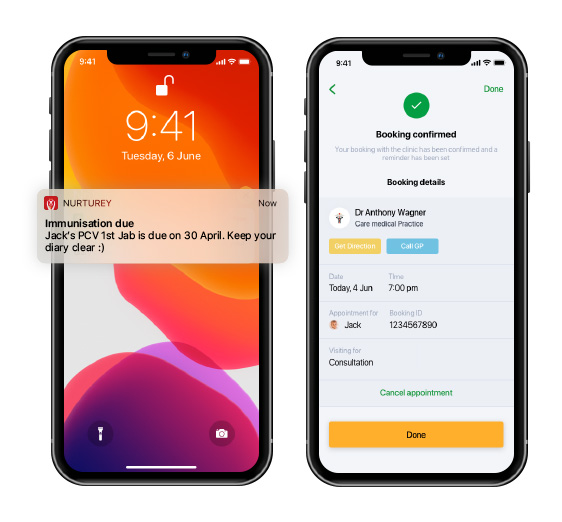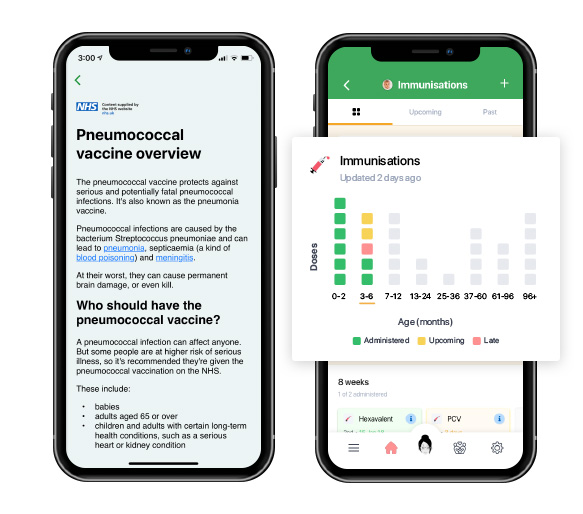Vaccinations Tool
Nurturey's Vaccinations Tool is an intuitive PinkBook feature that helps you track and manage your child’s vaccinations
How does Nurturey help?
Nurturey PinkBook, the digital upgrade to the NHS paper red book, helps manage your child's vaccination journey by:
Sending reminders about upcoming vaccinations
Don't worry about forgetting a vaccination - we'll help you keep track! Leading up to the date of vaccination, we will send helpful reminders that make sure your child never misses a dose.
Booking an appointment with your GP
One of the best features of Nurturey PinkBook is the ease and access of booking an appointment with the GP.
We'll remind you to book an appointment for your child's vaccination. Once booked through our app, we’ll update your calendar, sending you reminders about the upcoming appointment so you can plan your family's schedule.
You can use Messaging to ask any vaccination related query from your GP such as type of clothing, what to do if your child is feeling unwell, etc

Sending NHS guidance related to vaccinations
Parents may have questions about vaccinations so we help get you the answers! Receive trusted parental guidance directly from the NHS related to vaccinations and their care to keep you informed and updated
Accessing your child’s vaccination records
GP-linked accounts reflect the records your GP maintains - thus, you can view previous vaccinations and keep a track of upcoming ones to help manage your child’s schedule.

Childhood vaccination programme (From the NHS)
The NHS has a recommended schedule for childhood vaccination that protects your child from illnesses such as whooping cough, chickenpox, hepatitis B, meningitis, rotavirus, measles, mumps, and the flu, to name a few.
The NHS routine childhood vaccines are:
6-in-1:
Given in 3 doses, the 6-in-1 vaccine protects your child from diphtheria, hepatitis B, Hib (Haemophilus influenzae type B), polio, tetanus, whooping cough.
Rotavirus:
An oral vaccine given in 2 doses, this vaccine protects your child against rotavirus, an infectious stomach bug that typically affects babies and young children.
MenB:
The MenB vaccine, given in 3 doses, protects children against infection by meningococcal group B bacteria, which are responsible for more than 90% of meningococcal infections in young children.
HiB/MenC:
Hib and meningitis C infections are serious and potentially fatal diseases that cause meningitis and blood poisoning. Given at 12 months of age, the Hib/MenC vaccine helps protect toddlers against these diseases.
Pneumococcal vaccine:
Commonly known as the pneumonia vaccine, the pneumococcal vaccine protects your child against pneumonia, meningitis and blood poisoning. Depending on the year of your child’s birth, they may get 2 or 3 doses.
MMR:
Given in 2 doses, the MMR vaccine protects your child against measles, mumps and rubella. These 3 diseases are highly infectious and rapidly spread in unvaccinated people, often resulting in serious illness.
4-in-1 preschool booster:
The 4-in-1 pre-school booster vaccine is offered to children from the age of 3 years and 4 months to boost their protection against 4 different serious diseases: diphtheria, tetanus , whooping cough and polio.
Prior to this booster, children were protected by the 6-in-1 vaccine thus furthering bolstering the immune system.
3-in-1 teenage booster:
A single injection given when your child is in year 9, this booster protects against tetanus, polio and diphtheria.
MenACWY:
Recommended for teenagers (13 - 15 years of age), the MenACWY is a single dose vaccine that protects you against meningitis and blood poisoning. For freshers at university, the MenACWY vaccine along with the MMR vaccine is recommended to protect themselves.
HPV:
Offered to teenagers at 12 - 13 years of age, the HPV (Human Papillomavirus) vaccine protects against cancer caused by HPV such as cervical cancer, certain mouth and throat cancers, certain cancers of the genital and anal area. It also helps protect against genital warts.
In 2018, it was recommended that boys get the vaccination as well to reduce the risks of getting of HPV-related cancers such as head and neck cancers, and anal and genital cancers.
Flu:
The flu vaccine is recommended annually for:
- Children who have turned 2 or 3 years of age by 31st August
- All primary school aged children
- All year 7 in secondary school
- Children aged 2 to 17 with long term health conditions
Given as a nasal spray (unless advised otherwise), the flu vaccine helps protect children against the flu, which can be an unpleasant illness in children. It can also lead to serious problems such as bronchitis and pneumonia.
In addition, depending on your child’s history, your family history and other medical factors, your child may be suggested to get one of the following vaccines:
BCG
The BCG vaccination, which protects against Tuberculosis, is suggested for babies who are born in areas of the UK where the TB rates are high or have parents/grandparents from a country that has a high rate of TB transmission. It’s normally given at birth in a single dose, and can be given up to one year of age.
Older children should get their BCG vaccination if:
- They are under the age of 16 and have come from a country where TB is widespread
- They are at a higher risk of getting TB and were not vaccinated as a baby
- They are under 16 and have come in close contact with someone who has pulmonary TB
Chickenpox
Chickenpox vaccination is recommended for children in regular or close contact with someone who has a weakened immune system or is at risk of serious illness if they catch chickenpox
Travel vaccinations
When travelling outside the UK, you may need to get selected vaccinations to protect yourself and your family against certain illnesses.
At least 8 weeks before travel, go see your GP to find out which all vaccinations and their dose schedule you may need.



